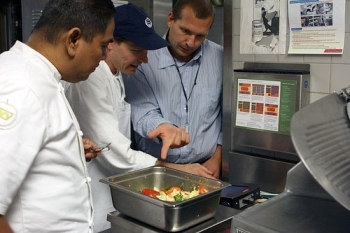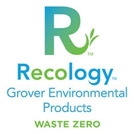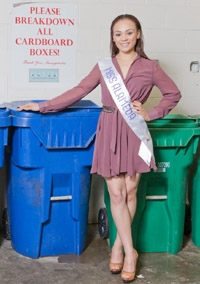Resource Library
- Brochures
This guide explains how to reduce waste and create beautiful landscapes using salvaged and recycled-content materials. It includes types and sources of materials as well as a section on using “urbanite” to build benches, garden walls and more. Although it was written for landscape professionals, it contains useful information for home gardeners.
Read More - Brochures
The Grasscycling Guide (available in English and Spanish) explains how to create healthy, attractive turf by recycling grass clippings on the lawn instead of removing them. The grasscycling case study features Del Conte's Landscaping's experience with grasscycling.
Read More  Success Stories
Success StoriesUC Berkeley’s foodservice provider Cal Dining measures types and amounts of pre-consumer food waste with specialized tracking equipment, then uses the findings to modify purchasing and food prep routines. Cal Dining has reduced food waste by 19%, equivalent to 27 tons/year, or $98,402/year in reduced food costs.
Read More- Brochures
 Success Stories
Success StoriesCompost made by Recology Grover Environmental Products (RGEP) is produced at a 166-acre composting facility in the Central Valley town of Vernalis. About 40-50% of the food scraps and yard trimmings used as feedstock originate in Alameda County, including the cities of Albany, Berkeley, Emeryville, Hayward, Livermore, Oakland and the sanitary districts of Castro Valley and Oro Loma.
Read More Success Stories
Success StoriesThe Zero Net Energy Center (ZNEC) in San Leandro is a partnership of the International Brotherhood of Electrical Workers (IBEW) Local 595 and the Northern California National Electrical Contractors Association (NECA). Completed in 2013 as a retrofit of an outdated commercial building, the 46,000-square-foot facility is the largest building in California that generates enough renewable energy on-site to meet its own electricity demand.
Read More Success Stories
Success StoriesWM EarthCare is Waste Management’s line of compost and mulch, produced at the company-owned composting facility at the Redwood Landfill in Novato. The locally sourced feedstock includes food scraps and yard trimmings from Alameda County residents in Albany, Castro Valley Sanitary District, Emeryville, Hayward, Oakland and Oro Loma Sanitary District—about 80,000 pounds each day.
Read More Success Stories
Success StoriesTraX, founded in Berkeley, is a new social impact media platform that encourages positive “reuse actions,” such as bringing a reusable cup, bag or straw to stores when shopping. Shoppers take action by photographing their reuse items via Instagram or Facebook mobile apps, add the store location and the #traXactions hashtag and share the action online for cash rewards.
Read More Success Stories
Success StoriesSouth Shore Center is a 594,000 square-foot open-air shopping mall located in Alameda, California. Commercial tenants share several waste stations located throughout the mall. Starting in 2011, South Shore Center has worked with its tenants, garbage hauler and StopWaste to increase recycling and introduce the collection of food scraps and other compostable materials, especially at the mall’s many food service businesses.
Read More Success Stories
Success StoriesFounded in 2011, The Sacred Wheel in Oakland sells cheeses and specialty foods, as well as sandwiches and soups, primarily from local, small business production. As the restaurant part of the business grew, so did the amount of trash from disposable service ware. Distressed to see so much material go to waste, the owners decided to switch to reusable dishes and utensils for food eaten at the café, and offer some items, such as straws, only on request.
Read More